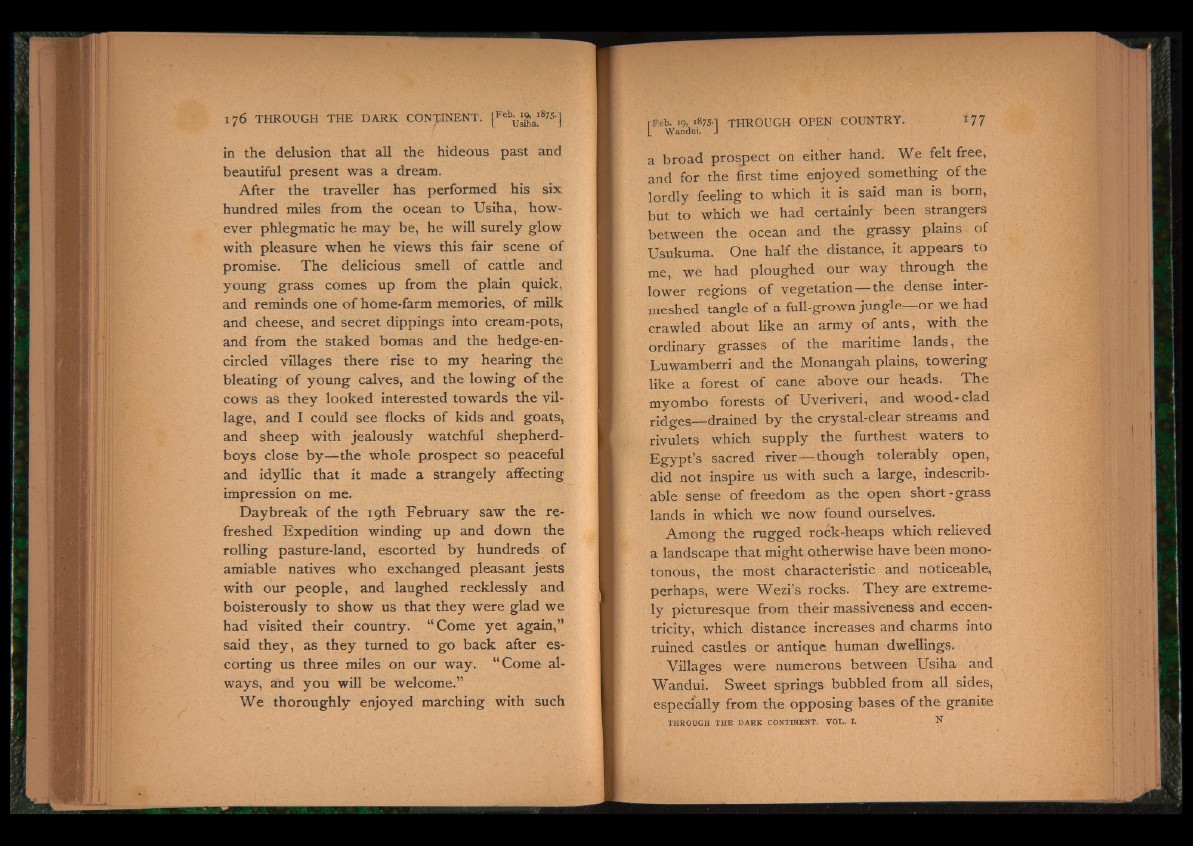
in the delusion that all the hideous past and
beautiful present was a dream.
A fte r the traveller has performed his s ix
hundred miles from the ocean to Usiha, however
phlegmatic he may be, he will surely glow
with pleasure when he views this fair scene o f
promise. T he delicious smell o f cattle and
young grass comes up from the plain quick,
and reminds one o f home-farm memories, o f milk
and cheese, and secret dippings into cream-pots,
and from the staked bomas and the hedge-encircled
villages there rise to my hearing the
bleating o f young calves, and the lowing o f the
cows as th ey looked interested towards the village,
and I could see flocks o f kids and goats,
and sheep with jealously watchful shepherd-
b o ys close b y— the whole prospect so peaceful
and idyllic that it made a strangely affecting
impression on me.
Daybreak o f the 19th February saw the refreshed
Expedition winding up and down the
rolling pasture-land, escorted b y hundreds o f
amiable natives who exchanged pleasant jests
with our p eo p le , and laughed recklessly and
boisterously to show us that they were glad we
had visited their country. “ Come y e t again,”
said they, as th ey turned to go back after escorting
us three miles on our way. “ Come always,
and y o u will be welcome.”
W e thoroughly enjoyed marching with such
rFeb. 19, 1,875.1 THROUGH OPEN COUNTRY. 177
L W a n d u i. J
a broad prospect on either hand. W e felt free,
and for the first time enjoyed something o f the
lordly feeling to which it is said man is born,
but to which we had certainly been strangers
between the ocean and the grassy plains of
Usukuma. One half the distance, it appears to
me, we had ploughed our w a y through the
lower regions o f vegetation— the dense intermeshed
tangle o f a full-grown jungle— or we had
crawled about like an army o f ants, with the
ordinary grasses o f the maritime lands, the
Luwamberri and the Monangah plains, towering
like a forest o f cane above our heads. T h e
myombo forests o f Uveriveri, and w o o d -c lad
ridges drained b y the crystal-clear streams and
rivulets which supply the furthest waters to
E g y p t’s sacred river— though tolerably open,
did not inspire us with such a large, indescribable
sense o f freedom as the open short-grass
lands in which we now found ourselves.
Among the rugged rock-heaps which relieved
a landscape that might otherwise have been monotonous,
the most characteristic and noticeable,
perhaps, were Wezi’s rocks. T h e y are extremely
picturesque from their massiveness and eccentricity,
which distance increases and charms into
ruined castles or antique human dwellings.
Villages were numerous between Usiha and
Wandui. Sweet springs bubbled from all sides,
especially from the opposing bases o f the granite
THROUGH THE DARK CONTINENT. VOL. I. N